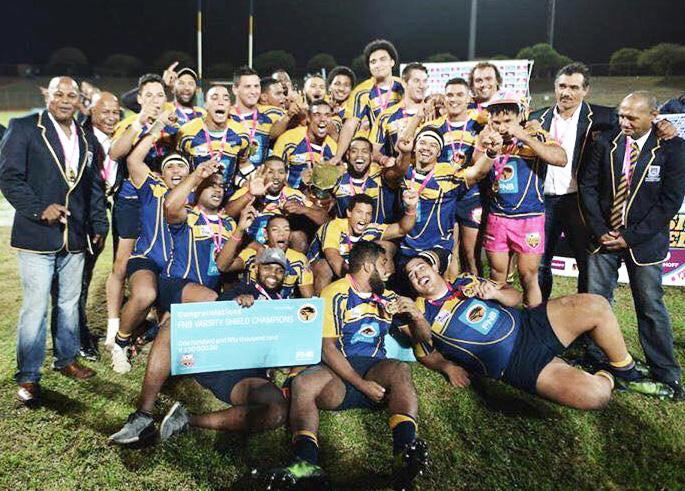
4 minute read
UDUBS SPORT ON THE UP AND UP
UWC’s astonishing rise as a key role player on the local, national and global sporting scene sets its student-athletes up for success
By Fabio De Dominicis
Traditionally, the University of the Western Cape (UWC) has been eclipsed by its more internationally recognised neighbours, Stellenbosch University and the University of Cape Town (UCT). However, the University’s eye-catching rise in recent years has turned heads in South Africa’s university sport scene as the institution continues to lay the foundation of many a student-athlete’s career.
Sandwiched between three important industrial zones on the outskirts of Cape Town, UWC’s campus may not have the aesthetically pleasing postcard backdrop of the Cape Winelands or Table Mountain like its provincial counterparts, but its recent upturn in both academic and sporting achievements has made it a fair contender amongst South Africa’s elite institutions.
Along with academic success, the University has produced many students who also excelled in sport over the years, yet whose efforts were often ignored. Thus, eight years ago, UWC set out a vision with a renewed focus on sport, raising the bar to afford prospective students an array of new opportunities.
“UWC has always produced great sports men and women, but the challenge has always been that these successes were not celebrated,” Mandla Gagayi, the University’s Director of Sport, says. “As such, UWC’s leadership took a deliberate decision in 2013 to make sport one of its priority tools towards building the University’s brand.
“This meant that more support and resources were invested towards building our sport into a professional and competitive entity. As a result, a strategy was developed to look at the recruitment of student-athletes and coaches, the development of sporting facilities, a new media footprint, as well as academic support for elite student-athletes.”
The University now offers 20 different sporting codes, divided into three categories: recreational, competitive and high-performance, with athletics, basketball, cricket, football, netball, rugby and hockey forming the latter.
The commitment to sport has reaped its rewards of late, with alumni like Herschel Jantjies forming part of South Africa’s winning World Cup Rugby team in 2019, Kurt-Lee Arendse starting for the national men’s Rugby 7s

side, footballer Thembi Kgatlana winning the 2018 African Female Player of the Year award and Babalwa Latsha becoming the first South African female rugby player to secure a professional rugby contract abroad.
In 2018, the University’s rugby side won the second-tier Varsity Shield competition to earn promotion to the prestigious Varsity Cup tournament for the first time in history, while the UWC women’s football side is one of three university teams playing in the recently-established SAFA National Women’s League.
The global health crisis brought progress to a screeching halt, as was the case the world over, yet the University’s sporting teams adjusted using innovative ways to continue training sessions and competitions online while in constant communication with their coaches. Additionally, UWC used the COVID-enforced break to tackle major infrastructure projects: the resurfacing of the athletics track and laser levelling of the main sports field.
“Our athletics track was more than 30 years old and had reached the end of its line,” Gagayi says. “Given that athletics is one of our high-performance sporting codes and that we plan to host national and international events, we sourced funding to invest in upgrading the track to the standards of World Athletics (previously the International Association of Athletics Federations). This includes an upgrade of the main field so we can host professional soccer matches, as well as provide a training venue for visiting teams.
“We have also established a high-performance gym with a full medical staff complement for our teams, which will also be open to visiting teams. Through these ventures, scheduled for completion in June, the University hopes to generate income that can go back into the development of more sporting facilities, as well as attract more elite athletes to UWC.”
It’s not only elite athletes but also elite coaches that have recently been involved in UWC structures. UWC women’s football head coach is Thinasonke Mbuli, assistant coach of the South African women’s national team, while former rugby head coaches include the late Chester Williams, who won the 1995 Rugby World Cup with the national team, as well as former Springboks coach Peter de Villiers. Current rugby head coach Paul Treu played for the national Rugby 7s team before coaching the national side for nine successful years, bringing a vast amount of experience and pedigree with him.
Ahead of this year’s FISU World University Student Games in Chengdu, China, Gagayi says UWC students have been putting in the hard work as selection for the world’s premier university sport competition draws near. “UWC has always provided a large number of student-athletes to Universiades and this year will not be any different,” he states. “Our student-athletes have been keeping busy with training as they know what it takes to get selected.
“Our mission is to support them with the necessary tools to be at their best when selection time comes.” As First Vice-President of University Sport South Africa (USSA), Gagayi hopes university sport will soon return for the thousands of eagerly awaiting student-athletes across the country. “My immediate wish is for sport to get back to action so students can go back to doing what they love,” he says. “I hope USSA will be able to field a strong team for the Universiade, given the circumstances.” Until then, rest assured that the student-athletes attending the University of the Western Cape will continue their training and utilise the numerous opportunities the institution has afforded them – all while aiding the University’s upward trajectory.


The full version of this piece was originally published on fisu.net.










